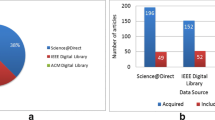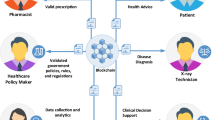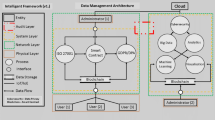Abstract
Electronic governance is used to empower citizens and help governments and organizations with strategic decision-making or policy-making. E-democracy and e-participation methods are essential tools used to engage citizens in decision-making. One of the recent e-democracy models is known as e-cognocracy. While having advantages relative to traditional e-democracy models, e-cognocracy still faces challenges such as fraud, centralization, information failure (voting paradox), and participation rate. This paper aims to design a blockchain-based electronic democracy model on a smart contract using e-cognocracy as the base model and the concept of futarchy and prediction markets. Using the design science research methodology, a three-stage blockchain-powered e-cognocracy method for democratic decision-making is developed. The proposed method of research includes three main stages: (1) Setting the problem, (2) the voting process, and (3) knowledge diffusion and evaluation, and the stage are done through several activities. This method is implemented as a smart contract on the Ethereum platform. Using the power of blockchain technology and the economic incentive model of futarchy, this method overcomes three main challenges for e-cognocracy. To demonstrate the methodology, it was applied in a real-case experience.

(Source: Moreno-Jiménez et al. 2014)

(Source:






(Source: Ethereum Blog)


Similar content being viewed by others
Notes
Voting paradox means the total perceived benefits of voting are less than the costs paid for a vote in the view of voters.
References
2014/06/CrossStateCheckStatistics.pdf
Aris MS, Putri DEK, Putra GA, Nugraha X (2023) The blockchain-based on E-voting in the local elections system: an effort to realize E-democracy. Jurnal Pembaharuan Hukum 10(1):27–42
Baudier P, Kondrateva G, Ammi C, Seulliet E (2021) Peace engineering: the contribution of blockchain systems to the e-voting process. Technol Forecast Soc Chang 162:120397
Benítez-Martínez FL, Hurtado-Torres MV, Romero-Frías E (2021) A neural blockchain for a tokenizable e-Participation model. Neurocomputing 423:703–712
Bindu N, Sankar CP, Kumar KS (2019) From conventional governance to e-democracy: tracing the evolution of e-governance research trends using network analysis tools. Gov Inf Q 36(3):385–399
Böhme R, Christin N, Edelman B, Moore T (2015) Bitcoin: economics, technology, and governance. J Econ Perspect 29(2):213–238
Buterin V (2016) What is ethereum? Ethereum Official webpage. Available: http://www.ethdocs.org/en/latest/introduction/what-is-ethereum.html
Carvalho A, Karimi M (2021) Aligning the interests of newsvendors and forecasters through blockchain-based smart contracts and proper scoring rules. Decis Support Syst 151:113626
Dahl RA (2000) On democracy. Yale Nota Bene, New Haven
Dannen C (2017) Introducing Ethereum and solidity, vol 1, pp 159–160
de Jager A, van Reijswoud V (2008) E-governance in the developing world in action. J Community Inform 4(2):66
Deng Q, Ji S (2018) A review of design science research in information systems: concept, process, outcome, and evaluation. Pac Asia J Assoc Inf Syst 10(1):2
Dresch A, Lacerda DP, Antunes JAV Jr, Dresch A, Lacerda DP, Antunes JAV (2015) Design science research. Springer International Publishing, pp 67–102
Ethereum Foundation (n.d.) What is Ethereum? Retrieved from https://ethereum.org/en/what-is-ethereum/
Feroz Khan G, Young Yoon H, Kim J, Woo Park H (2014) From e-government to social government: Twitter use by Korea’s central government. Online Inf Rev 38(1):95–113
Guegan D (2017) Public blockchain versus private blockhain
Hanson R (2003–2013) Shall we vote on values, but bet on beliefs. J Polit Philos.
Haskell J (2001) Direct democracy or representative government. Dispelling the Populist Mith. Westview Press, Oxford
Hrivas MK, Yeboah T (2018) The disruptive blockchain: types, platforms and applications. In: Fifth Texila world conference for scholars (TWCS) on transformation: the creative potential of interdisciplinary
Hussien H, Aboelnaga H (2013) Design of a secured e-voting system. In: 2013 International conference on computer applications technology (ICCAT). IEEE, pp 1–5
Ibrahimy MM, Norta A, Normak P (2022) Achieving corruption-transparency in service governance processes with blockchain-technology based e-participation. In: International conference on web engineering. Springer, Cham, pp 417–425
Kersting N (2012) Electronic democracy. Verlag Barbara Budrich
Khoury D, Kfoury EF, Kassem A, Harb H (2018) Decentralized voting platform based on ethereum blockchain. In: 2018 IEEE international multidisciplinary conference on engineering technology (IMCET). IEEE, pp 1–6
Kneuer M (2016) E-democracy: a new challenge for measuring democracy. Int Polit Sci Rev 37(5):666–678
Kneuer M, Datts M (2020) E-democracy and the matter of scale. Revisiting the democratic promises of the internet in terms of the spatial dimension. Politische Vierteljahresschrift 61(2):285–308
Kube N (2018) Daniel Drescher: blockchain basics: a non-technical introduction in 25 steps
Moreno-Jiménez JM, Polasek W (2003) e-democracy and knowledge. A multicriteria framework for the new democratic era. J Multi-criteria Decis Anal 12(2–3):163–176
Moreno-Jiménez JM, Pérez-Espés C, Velázquez M (2014) e-Cognocracy and the design of public policies. Gov Inf Q 31(1):185–194
Moreno-Jiménez JM, Pérez-Espés C, Rivera-Torres P (2020) Relevant aspects for an EF3-evaluation of e-Cognocracy. Mathematics 8(2):277
Nakamoto S (2008) Bitcoin: a peer-to-peer electronic cash system. Decentralized Business Review
Nam T (2017) A tool for liberty or oppression a cross-national study of the internet’s influence on democracy. Telemat Inform 34(5):538–549
Päivärinta T, Sæbø Ø (2006) Models of e-democracy. Commun Assoc Inf Syst 17(1):37
Palvia SCJ, Sharma SS (2007) E-government and e-governance: definitions/domain framework and status around the world. In: International conference on e-governance, pp 1–12
Peffers K, Tuunanen T, Rothenberger MA, Chatterjee S (2007) A design science research methodology for information systems research. J Manag Inf Syst 24(3):45–77
Peffers K, Rothenberger M, Tuunanen T, Vaezi R (2012) Design science research evaluation. In: International conference on design science research in information systems. Springer, Berlin, pp 398–410
Peña-López I et al (2016) Un e-government survey 2016. E-government in support of sustainable development. Tech. Rep., UNPAN. URL http://workspace.unpan.org/sites/internet/documents/UNPAN96407.Pdf
Poblet M, Allen DW, Konashevych O, Lane AM, Diaz Valdivia CA (2020) From Athens to the Blockchain: oracles for digital democracy. Front Blockchain 41:66
Qi R, Feng C, Liu Z, Mrad N (2017) Blockchain-powered internet of things, e-governance and e-democracy. In: E-democracy for smart cities, pp 509–520. Springer, Singapore, pp 509–520
Racsko P (2019) Blockchain and democracy. Soc Econ 41(3):353–369
Reis JCG D, Melão N (2023) E-democracy: artificial intelligence, politics and state modernization
Salazar JL, Piles JJ, Ruiz-Mas J, Moreno-Jiménez JM (2010) Security approaches in e-cognocracy. Comput Stand Interfaces 32(5–6):256–265
Szabo N (1997) The idea of smart contracts. Nick Szabo’s papers and concise tutorials
Tambouris E, Gorilas S (2003) Evaluation of an e-democracy platform for European cities. In: International conference on electronic government. Springer, Berlin, pp 43–48
Tanwar S, Gupta N, Kumar P, Hu YC (2023) Implementation of blockchain-based e-voting system. Multimedia Tools Appl 66:1–32
UNESCO (2005) Towards knowledge societies. UNESCO world report. http://unesdoc.unesco.org/images/0014/001418/141843.pdf
United Nations. (n.d.). E-Government Development Index. United Nations E-Government Knowledge Base. Retrieved from https://publicadministration.un.org/egovkb/en-us/About/Overview/-E-Government-Development-Index
Vladucu MV, Dong Z, Medina J, Rojas-Cessa R (2023) E-voting meets blockchain: a survey. IEEE Access 11:23293–23308
Weimer DL, Vining AR (1999) Policy analysis. Concepts and practices. Prentice-Hall, New Jersey
Wieringa RJ (2014) What is design science? In: Design science methodology for information systems and software engineering. Springer, Berlin, pp 3–11
Yaga D, Mell P, Roby N, Scarfone K (2019) Blockchain technology overview. arXiv preprint arXiv:1906.11078
Yang X, Yi X, Nepal S, Han F (2018). Decentralized voting: a self-tallying voting system using a smart contract on the ethereum blockchain. In: International conference on web information systems engineering. Springer, Cham, pp 18–35
Zheng Z, Xie S, Dai HN, Chen X, Wang H (2018) Blockchain challenges and opportunities: a survey. Int J Web Grid Serv 14(4):352–375
Zheng Z, Xie S, Dai HN, Chen W, Chen X, Weng J, Imran M (2020) An overview on smart contracts: challenges, advances, and platforms. Futur Gener Comput Syst 105:475–491
Zimmerman JF (1986) Participatory democracy. Populism revived. Praeger, NY
Author information
Authors and Affiliations
Corresponding author
Additional information
Publisher's Note
Springer Nature remains neutral with regard to jurisdictional claims in published maps and institutional affiliations.
Appendix
Appendix
At the end of the democratic process of blockchain-powered e-Cognocracy in the IFA, to evaluate the overall experience of the method, a questionnaire based on the EF3 evaluation model was designed. The questionnaire is valid when over 90 percent of the questions were answered. The measurement scale of the questionnaire is from 0 (totally disagree) to 10 (totally agree). This questionnaire is based on Moreno-Jimenez et al. work on the EF3 evaluation method in 2021.
-
(i)
The system of member participation
-
In the current system of participation, the association represents my opinions and defends my interest
-
Individuals have a role in association decision-making
-
Companies have a role in association decision-making
-
Individuals should participate in the design of decisions
-
Individuals should make decisions in conjunction with companies
-
The IFA take individual opinions into account for decision-making
-
The IFA take companies' opinions into account for decision-making
-
The IFA administration informs members about the existing mechanisms of citizen participation
-
The IFA administration informs the members about the decision taken
-
The IFA administration informs the ecosystem and industry about the decision taken
-
Blockchain-powered e-Cognocracy contributes to the creation of a better society
-
-
(ii)
The creation of a better society
-
Participation is limited to member consultation by the IFA board
-
Participation includes debate/discussion with members, but the decision is taken by the IFA board.
-
Participation allows the joint decision between the IFA board and members
-
-
(iii)
Motivation
-
I cannot miss the opportunity to be part of a member participation initiative like this one
-
I think it is a very important opportunity to express my opinion
-
I believe that this initiative will allow me to enrich myself as a person
-
I am interested in participating in cryptocurrency regulation activities
-
I do not agree with the current regulation in the cryptocurrency industry
-
-
(iv)
Evaluation of the Technology Support and Applications:
-
The computer equipment was adequate
-
The presentation structure of the program was simple and understandable
-
It was easy and comfortable to work with blockchain wallets
-
There were too many errors/incidents in the computer application
-
The web page was very well designed
-
The voting system was easy to use
-
The discussion system for the incorporation of arguments was adequate
-
The discussion system allowed me to know and share opinions
-
I consider that my anonymity was assured throughout the entire process
-
In general, I liked the design of the software application
-
In general, I am satisfied with the computer application used
-
-
(v)
Evaluation of the Information:
-
It was easy to understand
-
It was suitable
-
It was received on time
-
There were virtually no errors
-
In general, I am satisfied with the information that I have received
-
-
(vi)
Evaluation of the Support Staff
-
They helped my involvement in the member participation process
-
They gave me additional information
-
Without the support staff, I would not have been able to participate
-
Overall, I am satisfied with the help of the support staff
-
-
(vii)
Overall Evaluation:
-
I enjoyed participating in this initiative
-
I have learned a lot from the experience
-
I feel that my participation has improved my ingenuity and creativity
-
The experience allowed me to feel involved in regulatory decision making
-
My perception of social belonging in my association has increased (identity)
-
The discussions in the forum influenced my decisions
-
Participating in this experience was not a waste of time
-
I would participate again in a similar experience
-
Other associations should incorporate this type of member participation
-
Blockchain-powered e-Cognocracy improves the current democratic system
-
I feel satisfied with my participation in this initiative
-
Rights and permissions
Springer Nature or its licensor (e.g. a society or other partner) holds exclusive rights to this article under a publishing agreement with the author(s) or other rightsholder(s); author self-archiving of the accepted manuscript version of this article is solely governed by the terms of such publishing agreement and applicable law.
About this article
Cite this article
Ghazinoory, S., Mardani, A., Maddah-Ali, M.A. et al. A blockchain-powered e-cognocracy model for democratic decision making. Inf Syst E-Bus Manage (2024). https://doi.org/10.1007/s10257-023-00663-x
Received:
Revised:
Accepted:
Published:
DOI: https://doi.org/10.1007/s10257-023-00663-x




